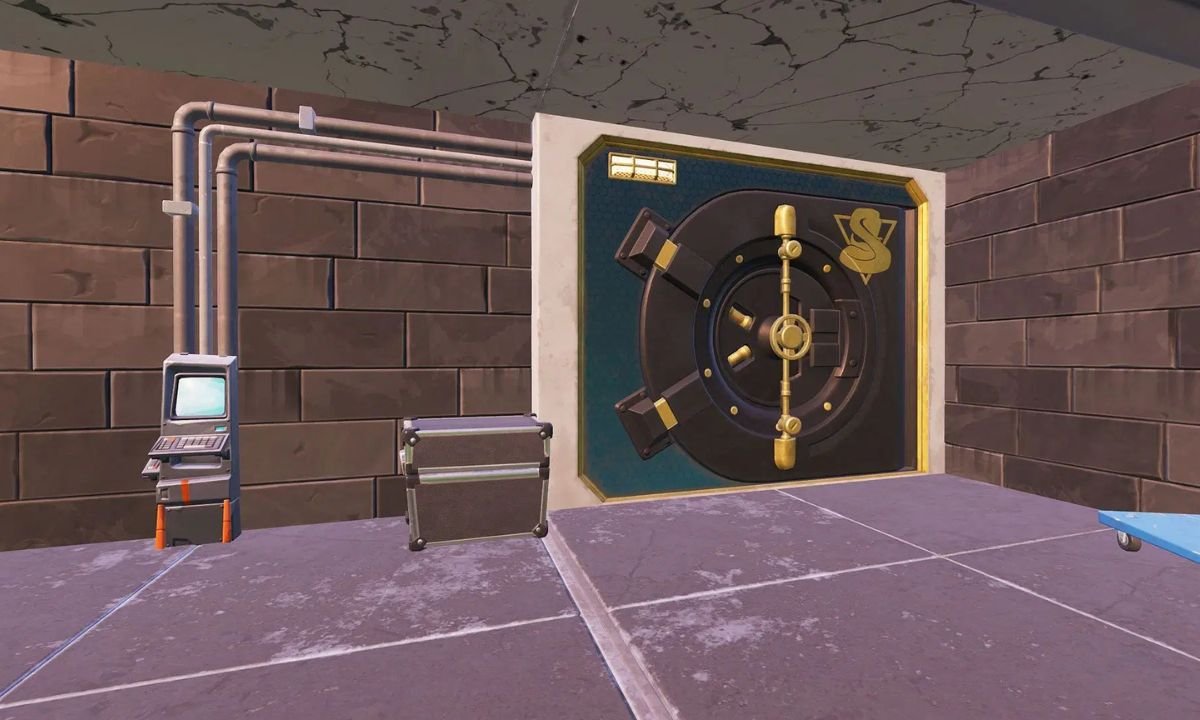So here's the deal, folks. If you're into word games or crossword puzzles, you've probably stumbled upon the term "vault opener NYT crossword." It's one of those phrases that can leave your brain spinning, trying to figure out what it really means. But don't worry, because today we're diving deep into this mystery and breaking it down for you. The vault opener NYT crossword is not just a random puzzle; it's a gateway to a world of linguistic challenges and mental stimulation. Let’s get into it, shall we?
Now, if you're thinking, "What on earth is a vault opener in the context of the New York Times crossword?"—you're not alone. This term has been buzzing around the puzzle community, and for good reason. The New York Times crossword is no ordinary puzzle. It's a mental workout that tests your vocabulary, logic, and creativity. And when it comes to vault openers, we're talking about those tricky clues that seem impossible to solve at first glance. But trust me, there's a method to the madness.
Before we jump into the nitty-gritty, let's set the stage. The NYT crossword isn't just a game; it's a cultural phenomenon. People from all walks of life gather around this puzzle, trying to crack the code. Whether you're a seasoned pro or a newbie, there's something about these puzzles that keeps you coming back for more. So, are you ready to unlock the secrets of the vault opener NYT crossword? Let's go!
Read also:Breckie Hill Sexy The Hottest Sensation Taking Over The Internet
Understanding the Basics of NYT Crossword
Alright, let’s break it down. The New York Times crossword puzzle is like the holy grail of word games. It's been around since 1942, and it's evolved into a daily challenge that millions of people look forward to. Each puzzle is crafted with care, and the clues are designed to test your knowledge and wit. But what exactly makes the NYT crossword so special? Well, it's all about the balance between simplicity and complexity.
What Makes NYT Crossword Unique?
The NYT crossword stands out because it’s not just about filling in the blanks. It’s about storytelling through words. Each puzzle has a theme, and the clues are often cleverly worded to make you think twice. Here are a few things that set the NYT crossword apart:
- Theme-based puzzles: Every crossword has a central theme, which ties the clues together in a unique way.
- Tricky wordplay: The clues often involve puns, anagrams, and other forms of wordplay that challenge your brain.
- Progressive difficulty: Monday puzzles are the easiest, while Saturday puzzles are the toughest. It's like a week-long journey of increasing complexity.
What is a Vault Opener?
So, what exactly is a vault opener? In the world of crossword puzzles, a vault opener is essentially a clue or answer that unlocks the rest of the puzzle. Think of it as the key that opens the door to solving the entire crossword. These clues are strategically placed to help solvers break through challenging sections of the puzzle. But here's the catch: they're not always easy to spot.
Why Are Vault Openers Important?
Vault openers play a crucial role in the solving process. They provide a sense of momentum and help solvers gain confidence as they tackle the rest of the puzzle. Without these key answers, the crossword might feel overwhelming or even impossible to solve. Here are a few reasons why vault openers are so important:
- They act as a starting point for solvers.
- They help break down complex sections of the puzzle.
- They create a domino effect, leading to more answers being filled in.
How to Identify Vault Openers in NYT Crossword
Identifying vault openers isn't always straightforward. It requires a combination of intuition, experience, and a keen eye for detail. But don't worry, there are some tricks you can use to spot these elusive clues. Here’s how:
Look for Simple Clues
Often, the simplest clues are the ones that lead to the most significant breakthroughs. These clues might seem too easy at first glance, but they can unlock entire sections of the puzzle. For example, a clue like "Three-letter word for cat" might seem basic, but it could be the key to solving a more complex section of the crossword.
Read also:New Pimple Popping Videos Why Theyrsquore Trending And Why You Canrsquot Stop Watching
Pay Attention to Repeated Letters
Another tip is to look for answers that share letters with other entries. These overlapping letters can help you fill in other parts of the puzzle. For instance, if you know that the answer to one clue ends with "ING," you can use that information to solve intersecting clues.
Strategies for Solving Vault Openers
Now that you know what vault openers are and how to identify them, let's talk about strategies for solving them. These tips will help you become a more effective crossword solver and increase your chances of cracking those tricky puzzles.
Use Crossword Apps and Tools
In today's digital age, there are plenty of tools and apps available to help you solve crossword puzzles. These apps can provide hints, definitions, and even suggest possible answers based on the letters you've already filled in. Some popular options include:
- NYT Crossword App
- Crossword Solver
- Wordplays
Practice Regularly
The more you practice, the better you'll become at identifying and solving vault openers. Consistent practice helps you recognize patterns, improve your vocabulary, and develop problem-solving skills. So, make it a habit to tackle a crossword puzzle every day. Trust me, your brain will thank you for it.
The Role of Vocabulary in Solving Vault Openers
Vocabulary plays a crucial role in solving crossword puzzles, especially when it comes to vault openers. Having a wide range of words at your disposal can make all the difference in cracking those tricky clues. Here are a few ways to expand your vocabulary:
Read Widely
Reading is one of the best ways to improve your vocabulary. Whether it's books, magazines, or online articles, exposing yourself to different types of writing can introduce you to new words and phrases. And the more words you know, the better equipped you'll be to tackle those challenging crossword clues.
Learn Word Roots and Prefixes
Understanding word roots, prefixes, and suffixes can help you decipher clues more easily. For example, knowing that "bio-" means life can help you solve clues related to biology or living organisms. This knowledge can be a game-changer when it comes to solving vault openers.
Common Mistakes to Avoid
Even the best crossword solvers make mistakes from time to time. But by being aware of common pitfalls, you can avoid them and improve your solving skills. Here are a few mistakes to watch out for:
Overthinking Clues
One of the biggest mistakes solvers make is overthinking clues. Sometimes, the simplest answer is the right one. So, if a clue seems too easy, don't dismiss it too quickly. Trust your instincts and give it a try.
Ignoring Overlapping Letters
Another common mistake is ignoring the letters that overlap with other entries. These shared letters can provide valuable clues and help you solve the puzzle more efficiently. So, always keep an eye on the intersections.
Famous Vault Opener Clues in NYT Crossword History
Throughout its history, the NYT crossword has featured some legendary vault opener clues that have left solvers scratching their heads. These clues have become iconic in the crossword community and are often referenced in discussions about the puzzle. Here are a few examples:
"African Nation" (Answer: TOGO)
This clue is a classic example of a vault opener. It's simple, straightforward, and can help solvers unlock other parts of the puzzle. The answer, TOGO, is short and sweet, making it easy to remember and recognize.
"Three-letter word for cat" (Answer: FELIS)
Another famous vault opener, this clue might seem easy, but it often trips up solvers who are expecting a more common word for cat, like FELIX or CAT. FELIS, the scientific name for domestic cats, is a great example of how crossword puzzles can expand your vocabulary.
Tips for Beginners
If you're new to crossword puzzles, don't be intimidated. With a little practice and the right strategies, you can become a pro in no time. Here are a few tips to help you get started:
Start with Monday Puzzles
Monday puzzles are the easiest, so they're a great place to start. As you gain confidence, you can gradually move on to more challenging puzzles. Remember, practice makes perfect!
Join Online Communities
There are plenty of online communities dedicated to crossword puzzles. These communities can provide support, tips, and even friendly competition. So, don't hesitate to join in and learn from others.
Conclusion
So there you have it, folks. The vault opener NYT crossword is not just a puzzle; it's a journey of discovery and learning. By understanding the basics of the NYT crossword, identifying vault openers, and using effective strategies, you can become a more confident and skilled solver. And remember, the key to success is practice, practice, practice.
Now, it's your turn to take action. Whether it's solving a crossword puzzle, joining an online community, or expanding your vocabulary, there's always something you can do to improve your skills. So, what are you waiting for? Grab a pencil and get started!
Table of Contents


